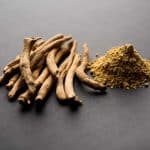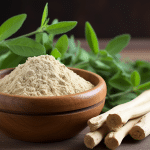The time-tested practices of ancient cultures and civilizations are at the heart of the traditional wisdom, which has translated to the discovery and rediscovery of some of the strongest and most universally applicable plant medicines on the planet. These herbs continue to hold up, because they have stood the test of time, and because their benefits are verified by modern science. Two of such remedies are Black Seed Oil and Ashwagandha. Used for thousands of years, these useful plant-based therapies support an array of organs and systems, as well as having a rejuvenating effect on the body.
While scientists and researchers have determined each has a wide array of mechanisms through which it affects health, a key capability of both is its tendency to decrease inflammation. By keeping inflammation at bay, these herbs affect your brain, heart, stress response, pulmonary health, immune function, and much more.
What is Black Seed Oil? And Can You Take it With Ashwagandha?
So can you take ashwagandha and black seed oil together, the answer is yes, you can take them together. By taking them together you are able to experience the anti-inflammatory benefits from both as they are great for your body and improving your overall health and wellbeing.
Dating from Egyptian Pharaonic times, the anigrilla plant, often called the Black Seed or Black Cumin, has immense historical importance as well as therapeutic potential. Black Cumin seed oil has been used so widely throughout the Middle East and Asia, that it is considered to be the universal cure-all. Researchers over the past several decades have begun investigating the potential health benefits of this wonder herb, and they have identified a number of active ingredients, with thymoquinone and nigellone being among the most notable.
Studies looking into the mechanisms of action of the active compounds have shown they possess potent anti-oxidant and anti-inflammatory qualities, as well as playing a direct modulation role on immune function. With these benefits, studies show that Black Seed Oil enhances your bodies ability to combat allergies; researchers found that the thymoquinone has anti-allergy properties via its powerful antihistamine effects, by blocking release of it from the membranes of immune cells. Additional studies have shown that black cumin seed oil has profound effects on lung health, namely, the bronchodilation effect, that is, relaxing smooth muscle tissue lining airways in the lungs, which provides cleaner, more relaxed airways to facilitate easier breathing, and helps to alleviate coughing. Black seeds further show cardioprotective effects, having an ability to maintain healthy cholesterol levels, as well as supporting overall cell health and function.
More on Ashwagandha
Ashwagandha is getting a lot of attention because of its reputation of being a stress-relieving medicine. However, most people are not aware of the herbal medicines traditional history and its workings. The Ashwagandha plant is a botanical plant which is famous within Ayurvedic medicine traditions, where it is classified as rasayana.
For Ayurvedic practitioners, this means it has the reputation of invigorating the body and contributing to healthy aging, by contributing to healthy longevity. Often considered to be the real-deal elixir, this herb has a documented history of usage dating back to 6,000 BCE, and is used extensively for the benefits of a variety of health conditions. Often called Indian Ginseng, Ashwagandha falls under the umbrella of adaptogens, herbs that help your body adjust to stressful situations and promotes feelings of balance.
Traditionally, this balancing property is what has contributed to its health-supporting properties. One of its biggest benefits is its role as a natural anti-inflammatory. Ashwagandha may reduce C-reactive protein, which is the marker of inflammation levels in the body, which indicates it may have a positive effect on chronic inflammation. Ashwagandha supports stress management, heart health, joint health, mood, sleep, and is an overall body-rejuvenating herb.
How Ashwagandha and Black Seed Oil Reduce Inflammation in The Body
Inflammation is one of the natural mechanisms the body uses to protect tissues against outside challenges. However, when inflammation becomes excessive or chronic, it causes health problems and promotes chronic diseases. There are a few ways you can decrease inflammations effects on your body. These include diet and lifestyle practices that support anti-inflammatory effects.
However, herbs like Black Seed Oil and Ashwagandha also hold genuine promise as natural anti-inflammatory therapies. Recent studies on black seed oil have shown some beneficial effects on inflammation.
One of the main active compounds of black seeds is thymoquinone. Studies have shown that thymoquinone may inhibit production of inflammatory mediators, in addition to oxidative stress. In studies on immune cells, it was found that thymoquinone inhibits the enzyme 5-lipoxygenase (5-LOX) and its byproducts, leading to strong anti-inflammatory effects.
While 5-LOX is the main inflammatory-promoting enzyme, and 5-LOX inhibition is a major focus of several anti-inflammatory therapies, the downstream effects from reducing the 5-LOX activity by black seed oil also result in decreased eicosanoid production, further chemical messengers of the inflammation response. Thus, one of black seed oils true benefits is its ability to suppress inflammation in the body. Additional studies on immune cells have shown that the administration of black seed extract decreases cyclooxygenase (COX) enzyme production, supporting black seed oils ability to decrease inflammation through targeting several key pathways.
The anti-inflammatory effects of black seeds are also supported by findings from studies on humans. In one study, participants suffering from joint problems who took a month-long supplement of black seed showed reduced levels of pro-inflammatory white blood cells, improved joint function, and reduced swelling and stiffness of joints, as compared to a placebo. These effects suggest potent reductions of inflammation by black seed supplementation. Additional studies indicate black seed extract may directly influence the regulation of inflammation in the lungs.
In one animal study of allergic asthma, black seeds reduced inflammation of the lungs and peripheral blood eosinophils. While black seeds work as a natural anti-inflammatory, Ashwagandha is also no slouch when it comes to moderating inflammatory states of the body. Due to its active compound known as withaferin, multiple studies have shown that ashwagandha may target several inflammatory mechanisms of the body in order to decrease the general level of inflammation.
Recent studies revealed the capacity of withaferins in ashwagandha to affect the two main signaling markers for inflammation in humans, the nuclear factor kappa B (NF-kB) and nuclear factor-erythroid 2-related factor 2 (Nrf2). These signaling molecules trigger a downstream release of inflammatory proteins, which serves to enhance inflammation and oxidative stress across the entire body. By targeting these pathways specifically, Ashwagandha inhibits an overall state of inflammation. Several chronic disease states are affected by these signaling pathways, in which these inflammatory markers trigger the chronic inflammatory increase. Conditions such as diabetes, obesity, and arthritis, among others, are affected by the elevated state of inflammation caused by the activity of these signaling molecules.
Since Ashwagandha targets these pathways, it is plausible that it may provide a substantial benefit to individuals with chronic inflammatory conditions. Ancient tried-and-true remedies are being proven useful to maintain health in the face of chronic diseases faced by society today. Two of the most promising are Black Seed Oil and Ashwagandha. Among their other health benefits, these herbs have anti-inflammatory properties. Offering support in the reduction of inflammation in the body, they have significant promise in improving the human health.















